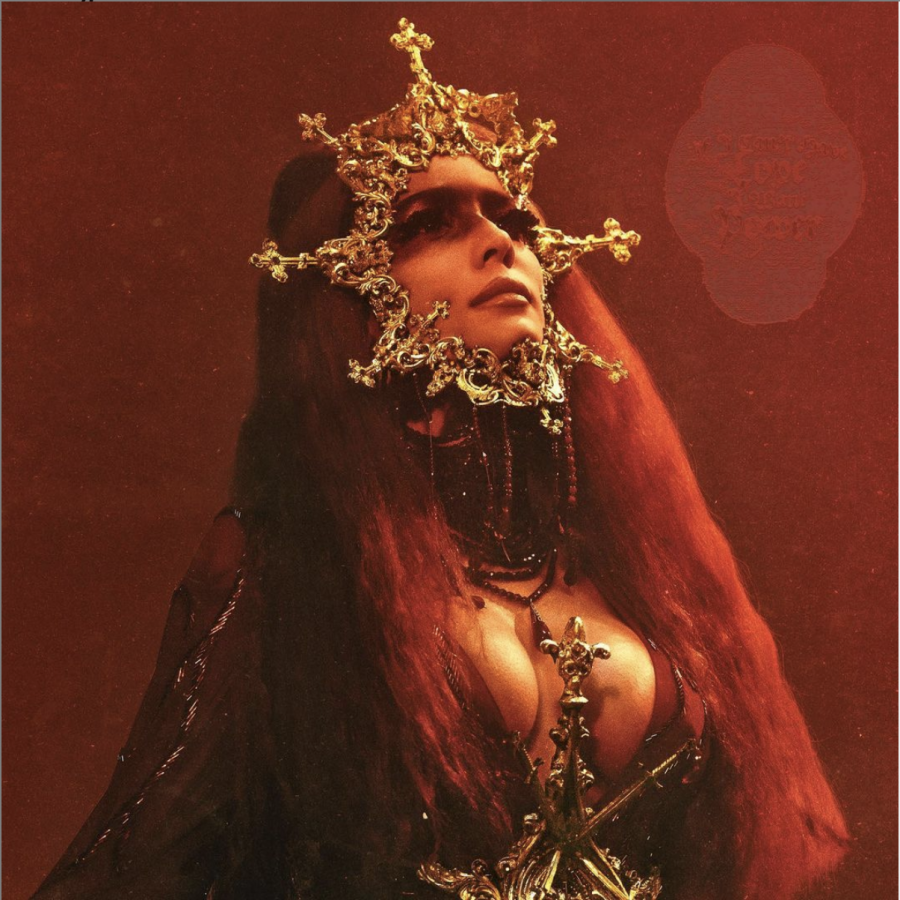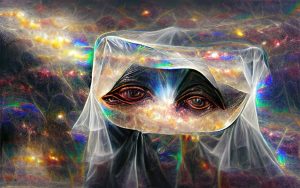Halsey’s New Album is Her Biggest Statement Yet
Halsey’s fourth studio album debuted at Number 1 on Billboard’s Top Album Sales. Shortly after, “If I Can’t” topped Alternative charts for the first time since “Badlands”. Halsey released a limited edition cover for the “If I Can’t” vinyl at Urban Outfitters. Photo used with permission from Instagram.
September 13, 2021
What happens when an alt-pop icon gets together with industrial metal legends Trent Reznor and Atticus Ross? Halsey answers this question in her latest album, If I Can’t Have Love, I Want Power, an explosive exploration of femininity and the duality of self-hatred and self-worship through the use of religious iconography.
Halsey announced their collaboration with the producers from the rock band, Nine Inch Nails (NIN), who recently won an Oscar for their film scores earlier this year. This led many fans to speculate about what their newest album might bring to the table. Would it be rock? Or would the tone be broody and dark? What kind of experimental creations would they get up to? Well, Halsey’s If I Can’t Have Love, I Want Power brings it all to the table.
Through 13 vastly different and wildly cohesive songs, Halsey moves in with a new sense of purpose and maturity to their songwriting. Considering Halsey wrote much of the album while pregnant with their first child, this makes sense. Each song flows into the next like a stream of consciousness unable to be broken. The album comes out like a wild animal during its faster, punkier bits (specifically looking at you, “Easier than Lying”). Furthermore, Reznor and Ross’s influence is found all throughout this album and the legendary Dave Grohl of Foo Fighters and Nirvana even makes an appearance on the track “honey.”
View this post on Instagram
The Nine Inch Nails duo and Halsey worked fragility and feminism into the very life force of this album. The If I Can’t Have Love… opening track “The Tradition” brings a hauntingly beautiful melody to the lyrics promoting independence. It was an incredibly powerful opener and was able to set the tone for the rest of the album as empowering and bold, an anthem for non-binary people centered on Haley’s own experiences.
“Bells in Santa Fe” ties back to the album cover which is framed in such a way to resemble the Virgin Mary and baby Jesus. “Bells” brings the album sleeve into context with a well-placed lyric of biblical iconoclasm in the form of “Jesus needed a three day weekend to sort out this.” Right away, Halsey sets forth a religious theme which they use to dissect social and institutional concepts on womanhood and femininity.
The electropop of “Bells” then cuts out, creating an abrupt transition into the rock beat of “Easier than Lying”. The first verse carries through the biblical imagery of the previous song, and then the chorus hits. This song is about destruction, loss, manipulation, and betrayal. Halsey sings “‘Cause I’ll hang myself if you give me rope” which they revealed to be a play on the phrase “giving someone enough rope to hang themselves”.
“Giving someone enough rope to hang himself” is an expression that means like, empowering someone with an ability or power that will later become a self detriment to them. The thing that destroys them. It’s a play on that because…. Nvm you’ll see 🙂 https://t.co/pqehSMm0yL
— h (@halsey) August 21, 2021
Sticking to the biblical imagery, the fourth song is named after the intrinsic she-demon in Judaic mythology, Lilith. “Lilith” follows a very dark musicality relying on a simple drumbeat and a thumping, fuzzy and distorted bassline. Halsey’s voice almost serves as a beacon of hope against the dark musical scenery, except for when they distort their vocals and turn them sinister.
Reznor and Ross let their past with Nine Inch Nails really shine through on “Girl is a Gun”. The drumming is reminiscent of NIN’s first album Pretty Hate Machine’s drum samples and drum machines coupled with hints of electronic programming in the background. Halsey’s voice soars over the chaotic backbeat and sings about the wonders of love and the issues of falling in love too easily.
The sixth track, “You asked for this,” is haunting and disturbing because the verses and the outro are laced with suburban imagery. Whereas the two verses paint a simple, suburban picture, the outro juxtaposes suburbia with a pleasurable, avant-garde life. “You asked for this” is upbeat and drum-filled, a huge contrast to the seventh track.
While tracks like “Girl is a Gun” gave the album an edge with an obvious NIN influence, “Darling” is more melodic. Written as a lullaby for Halsey’s unborn child, “Darling” mimics the folksy ambiance of Taylor Swift’s evermore. Although the verses show uncertainty (“Couldn’t really tell you where they’d leave a stone / To visit me when I am dead and gone”), the chorus and the bridge are incredibly reassuring (“Darling don’t you weep / There’s a place for me / Somewhere we can sleep / I’ll see you in your dreams”). The images in “Darling” were incredibly striking, and all in all, it was a beautiful song.
Thank you T 🥺🥺🥺 means so so much https://t.co/hQ5VcXwwfy
— h (@halsey) August 29, 2021
“All the little flowers gave me something to believe in.” – darling
“A flower bud in concrete.” – moreThey are double entendres and make sense in their own contexts, but also have a double meaning of “all the losses gave me hope to hold out for my baby!” https://t.co/ySLaF3l1rA
— h (@halsey) August 28, 2021
It’s only fitting that the date Halsey found out they were pregnant ended up as a song title, seeing as their pregnancy was an inspiration behind If I Can’t…. Track 8, “1121”(November 21st), details Halsey’s struggles with pregnancy and their self-image during pregnancy. At its core, “1121” is about Halsey coming to terms with their pregnancy and accepting that there is a human child growing inside them. The chorus is especially beautiful with the lyrics “I won’t die for love / But ever since I met you / You could have my heart / And I would break it for you”.
Initially written as a quick experiment for Halsey to show their brother how they write and produce songs, “honey” ended up featuring Dave Grohl on drums. The pop-punk track sounded the most similar to Halsey’s 2015 album, Badlands. Although the vocals on “honey” were brilliant, it’s Dave Grohl’s drumming that really makes the song. Insider described it as precise and feisty, like a memory that returns with a vengeance at 3 am.
A wild girl https://t.co/AKMitJ8pO8
— h (@halsey) August 11, 2021
“Whispers” is an evocative song about mental illness and its effects on relationships. Through this song, Halsey explores their bipolar disorder and their self-sabotaging tendencies (“Sabotage the things I love most / Camouflage so you can feed the lie that you’re composed”). They also address some comments other celebrities have made towards them about their mental health issues.
If Ariana Grande’s “God is a Woman” turned edgy, it would become “I am not a woman, I’m a god”. In an interview, Halsey revealed that If I Can’t… is not about female empowerment. Through this song, they convey that they are anything and everything except a woman (“I am not a woman, I’m a god / I am not a martyr, I’m a problem”). The song very much emulates a girl-power anthem; this was intentionally ironic. “I am not a woman…” is a great reflection of the duality between self-hate and narcissism that characterizes Halsey’s music. Throughout the song, Halsey calls themselves a god, a fraud, and a problem.
“The Lighthouse” was reminiscent of a poem Halsey published in 2020 with the same name. When the poem came out, fans speculated that “Lighthouse” was about Halsey’s abusive relationship with G-Eazy. “The Lighthouse” has haunting vocals that are offset by the rhythmic drumbeat. The song carries an extended metaphor of sirens, sailors, and a lighthouse. The whole song is reminiscent of a siren call as the lyrics suggest.
Yes. Devour men. Spit them back into the ocean. https://t.co/3O2JFudBCb
— h (@halsey) August 28, 2021
“Ya’aburnee” is an Arabic phrase translating literally to “may you bury me,” but it’s typically used to tell someone that living without them would be too painful. This is reiterated in the chorus where Halsey sings “you will bury me before I bury you”. Halsey’s voice is considerably softer here than it was in “The Lighthouse”. The drums are still rhythmic; however, they’re not as prominent. In fact, throughout the whole song, the focus is on Halsey’s vocals rather than the background accompaniment. Ultimately, this song was a beautiful ending to the album.
If I Can’t Have Love, I Want Power was poignant and unhinged. The various elements came together to create an album about love, loss, and Halsey’s struggle with femininity as well as their mental health. This is an album that needs to be listened to in its entirety. Each song, relatable and honest, tells a different part of the same story. Halsey’s fourth album is a whirlwind of paradoxes. It’s chaotic and messy and so very real. If I Can’t… has all the makings of a legend.





